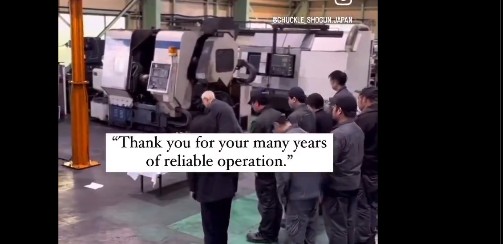
I just spotted this on Twitter. Not sure how common this is in Japan, but this short video shows a farewell ceremony they give to a machine about to be retired after years of service at a factory. The whole thing baffled me at first, but then I recalled it was common in Europe to personalize inanimate objects—Medieval Age swords, for instance, being the first thing that comes to mind, but I think this was also the case with tools in certain pre-modern crafts and trades. However, I think in the West this sort of practices have fallen into disuse in recent centuries. Was it Christianity (more precisely the Reformation)? Capitalism? I guess I'm more for the latter, considering the reputed estrangement of the factory worker from his work, and consequently from the tools and machines it involves. Should we assume Capitalism in Japan has taken a wholly new form, one of its characteristics being this particular—personal, so to speak—relationship with the machine? Down on the thread, someone refers to Shintoism. Could it be capitalism with a Shintoist backdrop—instead of a Christian-Protestant one—would serve as a possible explanation?
What do you think?
At first, Shinto was animistic. Primitive religions of that sort, in my opinion, existed everywhere in the world. More than a century ago, Shinto was tragically controlled as a monotheistic religion and linked to the imperial family to strengthen the military. However, its animism elements has persisted and had an impact on our culture and way of life for some reason. We have a tendency to believe that inanimate objects, such as machines, are alive. The video doesn't seem that strange to me; perhaps some Japanese people still do that sort of thing today. The music in the video isn't my cup of tea, though.
I understand now! It was not a "person" that was being retired after many years of service -- it was a thing! Yes, this is a Shinto way of seeing the world. The division between "humans" and "objects" is illusionary. Everything has some reverberation of the kami (神) in it. Stones can be sacred. Swords can be sacred. Some Japanese take their automobiles to Shinto shrines to get them "purified." So this video makes sense in a Shinto worldview.
Thank you, Akiko, Tim! Very interesting
From my point of view, @eugen_blick , it is true that in human rituals throughout history, there is an emotional connection with objects. As Tim says, a clear example is in Shinto. But I would not forget that all humans during our childhood personalise and humanise all objects around us. The ‘I’ becomes diluted in things and my ego becomes associated with the animal or totem object.